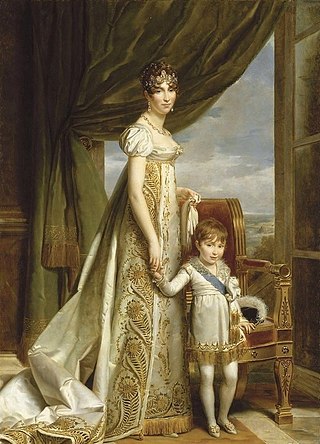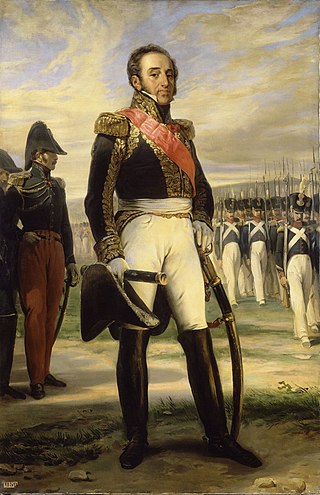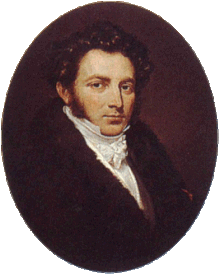
Louis Napoléon Bonaparte was a younger brother of Napoleon I, Emperor of the French. He was a monarch in his own right from 1806 to 1810, ruling over the Kingdom of Holland. In that capacity, he was known as Louis I.

Napoleon II was the disputed Emperor of the French for a few weeks in 1815. He was the son of Emperor Napoleon I and Empress Marie Louise, daughter of Emperor Francis I of Austria. Napoleon II had been Prince Imperial of France and King of Rome since birth. After the fall of his father, he lived the rest of his life in Vienna and was known in the Austrian court as Franz, Duke of Reichstadt for his adult life. He was posthumously given the nickname L'Aiglon.

Jérôme-Napoléon Bonaparte was the youngest brother of Napoleon I and reigned as Jerome Napoleon I, King of Westphalia, between 1807 and 1813.

Lucien Bonaparte, 1st Prince of Canino and Musignano, was a French politician and diplomat of the French Revolution and the Consulate. He served as Minister of the Interior from 1799 to 1800 and as the president of the Council of Five Hundred in 1799.

Hortense Eugénie Cécile Bonaparte was Queen of Holland as the wife of King Louis Bonaparte. She was the stepdaughter of Emperor Napoléon I as the daughter of his first wife, Joséphine de Beauharnais. Hortense later married Napoléon I's brother, Louis, making her Napoleon's sister-in-law. She became queen consort of Holland when Louis was made King of Holland in 1806. She and Louis had three sons: Napoléon-Charles Bonaparte; Napoleon III, Emperor of the French; and Louis II of Holland. She also had an illegitimate son, Charles, Duke of Morny, with her lover, the Comte de Flahaut.

Louis-Gabriel Suchet, duc d'Albuféra, was a French Marshal of the Empire and one of the most successful commanders of the French Revolutionary and Napoleonic Wars. He is regarded as one of the greatest generals of the Napoleonic Wars.

Auguste Charles Joseph de Flahaut de La Billarderie, Comte de Flahaut was a French general during the Napoleonic Wars, a senator, and later in his life, a French ambassador to the Court of St James's. He had a son with Napoleon's stepdaughter, Hortense de Beauharnais.

Louis-Nicolas d'Avout, better known as Davout, 1st Prince of Eckmühl, 1st Duke of Auerstaedt, was a French military commander and Marshal of the Empire who served during both the French Revolutionary Wars and the Napoleonic Wars. His talent for war, along with his reputation as a stern disciplinarian, earned him the nickname "The Iron Marshal". He is ranked along with Marshals André Masséna and Jean Lannes as one of Napoleon's finest commanders. His loyalty and obedience to Napoleon were absolute. During his lifetime, Davout's name was commonly spelled Davoust - this spelling appears on the Arc de Triomphe and in much of the correspondence between Napoleon and his generals.

Joseph Fouché, 1st Duc d'Otrante, 1st Comte Fouché was a French statesman, revolutionary, and Minister of Police under First Consul Napoleon Bonaparte, who later became a subordinate of Emperor Napoleon. He was particularly known for the ferocity with which he suppressed the Lyon insurrection during the Revolution in 1793 and for being a highly competent minister of police under the Directory, the Consulate, and the Empire. In 1815, he served as President of the Executive Commission, which was the provisional government of France installed after the abdication of Napoleon. In English texts, his title is often translated as Duke of Otranto.

Armand-Augustin-Louis de Caulaincourt, duc de Vicence, was a French military officer, diplomat and close advisor to Napoleon I.

Pierre-Narcisse, baron Guérin was a French painter born in Paris.

Nicolas François, Count Mollien, was a French financier. The son of a merchant, he early showed ability, and entered the ministry of finance, where he rose rapidly; in 1784, at the time of the renewal of the arrangements with the tax-farmers-general, he was practically chief in that department and made terms advantageous to the national exchequer.

Roustam Raza, also known as Roustan or Rustam, was a mamluk bodyguard and secondary valet of Napoleon.
Marchand is a frequent surname in France, in Quebec, and in Louisiana.. It is sometimes anglicized to "Merchant", "Marchant", or "Merchand", all with similar pronunciations to Marchand.

The Treaty of Fontainebleau was an agreement concluded in Fontainebleau, France, on 11 April 1814 between Napoleon and representatives of Austria, Russia and Prussia. The treaty was signed in Paris on 11 April by the plenipotentiaries of both sides and ratified by Napoleon on 13 April. With this treaty, the allies ended Napoleon's rule as emperor of the French and sent him into exile on Elba.

Jean Gabriel Marchand, 1st Count Marchand went from being an attorney to a company commander in the army of the First French Republic in 1791. He fought almost exclusively in Italy throughout the French Revolutionary Wars and served on the staffs of a number of generals. He participated in Napoleon Bonaparte's celebrated 1796-1797 Italian campaign. In 1799, he was with army commander Barthélemy Catherine Joubert when that general was killed at Novi. Promoted to general officer soon after, he transferred to the Rhine theater in 1800.

Michel, comte Ordener was a French general of division and a commander in Napoleon's elite Imperial Guard. Of plebeian origins, he was born in L'Hôpital and enlisted as private at the age of 18 years in the Prince Condé's Legion. He was promoted through the ranks; as warrant officer of a regiment of Chasseurs à Cheval, he embraced the French Revolution in 1789. He advanced quickly through the officer ranks during the French Revolutionary Wars.

Louis-Étienne Saint-Denis was a member of the Mamelukes of the Imperial Guard, leading him to be known in his lifetime as "Mamelouk Ali". He was most notable as a faithful servant to Napoleon I during his two exiles on Elba and Saint Helena.
Louis Joseph Marchand may refer to:

At the beginning of his career, Napoleon was a soldier and wore the uniform of the French Revolutionary Army. In 1793 he was promoted to Général de brigade, in 1795 Général de division, and in 1796 he became commander in chief of the Army of Italy. In those capacities, he wore the uniform of a French Army general as promolgated by the regulations of January 1796. This was, a double breasted blue (woollen) coat with red collar, red cuffs with white flaps, gold oak-leaf embroidery on the collar, cuffs, pickets and fron tand rear openings, and a red and white sash with gold trim. There does not seem at this point to be any differentiation between grades of general. Napoleon wore this in Italy, Egypt, and at the Battle of Marengo in 1800.



















